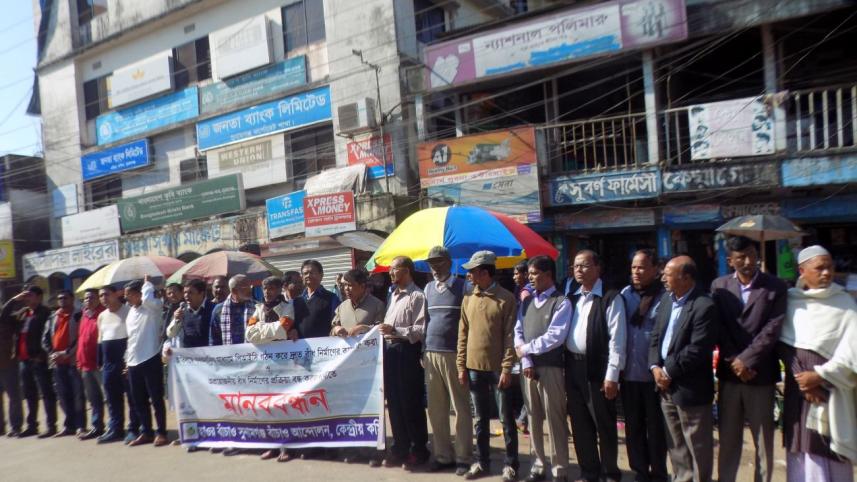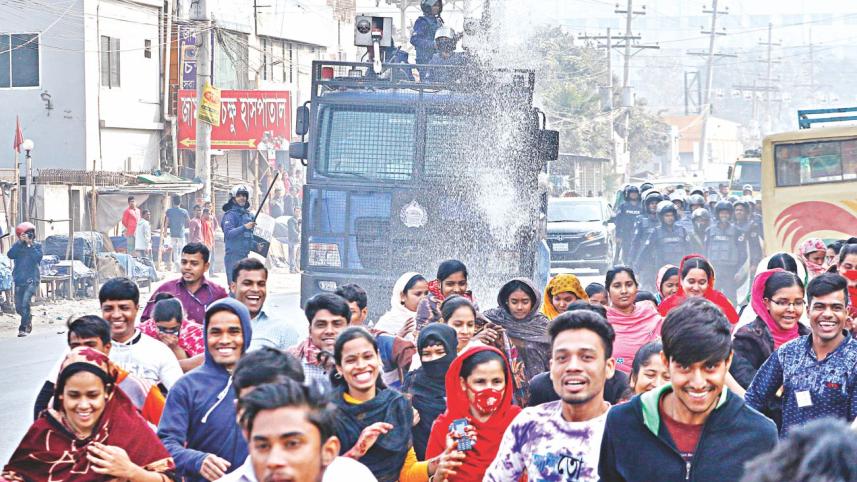Tanvir Mokammel on his latest film “Rupsha Nodir Baanke”

Ekushey Padak winner and multiple-time National Film Award-winning eminent filmmaker Tanvir Mokammel's seventh feature film, "Rupsha Nodir Baanke" (Quiet Flows the River Rupsha) released today.
The film will have its world premiere at the 51st Goa International Film Festival, scheduled during 16-24 January, 2021.
The film is running at STAR Cineplex and Jamuna Blockbuster in the capital. It is also being shown at Shahbag's Public Library Auditorium (3:00 pm, 5:30 pm and 8:00 pm).
In a candid chat with The Daily Star, Tanvir Mokammel shared his experience, expectations and challenges of making the film.
What are the major challenges you have faced during the making of "Rupsha Nodir Baanke"?
We specifically faced two challenges. First, we had to collect and organise hundreds of farmers to take part in constructing the dam. To prepare such a huge number of participants for the camera, dressing them and feeding them was difficult. Secondly, the amount of government grant (Anudan) was not enough to complete the film, we had to raise the rest of the money through crowdfunding. In Bangladesh, raising money for any well-meaning film endeavour is always challenging.

How tough is it to recreate history in period films, that too with a budget as low as BDT 96 lakhs?
It might have been impossible to portray history so diligently, expanding over the anti-British Swadeshi Movement up to the 1971 Liberation War of Bangladesh, in such a meagre budget.
My unit made it possible with their dedication and hard work. Besides, we had done something similar in our previous film "The Drummer" (Jibondhuli) as well, based on Bangladesh's Liberation War.
Our alternative cinema is not capital intensive, it is labour intensive. We hardly ever have any extra money. We have to work hard and through dedication, we have to overcome the paucity of funds. It is difficult, but not impossible. Any of our films will prove that.

Could you share a bit of the film's plot with us?
The story centres around the life of Manob Mukherjee -- a dedicated left wing leader, who was murdered in 1971 by the Rajakars (war criminals).
Comrade Mohammad Farhad once told me that there were 136 such dedicated leftist leaders, all over Bangladesh, who made immense sacrifices and had organising skills. They spread the ideas of social progress among the masses of this land.
The contribution of these leaders in spreading political justice, democracy, social progress and even the advancement of Bengali culture was great.
However, as leftists have no representation in our state narratives or in the corporate media, their sacrifices and stories are never told. Hence, I wanted to tell their stories through Comrade Manob Mukherjee -- portraying him during the anti-British Swadeshi Movement, the Partition of Bengal in 1947, 1950 Khapra Ward jail killing, the Language Movement of 1952, the United Front election of 1954 and finally, his murder in 1971 during our Liberation War.
A big chunk of his life was spent in prison. Through the portrayal of Comrade Manob Mukherjee, we have tried to tell the story of that generation and their struggle.

The film is jointly government-granted and crowdfunded. According to you, what are the advantages and disadvantages of crowdfunding?
Crowdfunding has its own challenges and problems. People will not contribute unless the theme of the film is worthy enough. Also, they have to have full faith in that particular film unit. So, raising money through crowdfunding is not easy for just any film unit. We were fortunate enough for that.
Our previous film "Seemantorekha" (The Borderline), a documentary on the Partition of Bengal in 1947, was also made with crowdfunding. People had confidence on the ability of our film unit and also the faith that the money would be properly used.
Although we were a bit short, we managed to complete the project. Crowdfunding is a great way to bring a vision to life.
"Rupsha Nodir Baanke" was Mahfuzur Rahman Khan's last cinematography outing, before his unfortunate demise. Do you want to share some memories of working with him in this project?
The demise of Mahfuz bhai before the release of "Rupsha Nodir Baanke" was heartbreaking for us. It is a colossal loss not only for our film unit, but for the film industry as a whole.
He was a cinematographer par excellence, and a craftsman with immense finesse. He had worked with us in our previous film "Jibondhuli" too. He was a superb teammate and a close friend of mine.
What are your expectations about this film releasing during the pandemic?
The pandemic is definitely a concern. People are hardly going out these days. I am not sure how many will venture out to come and watch our film. However, we have waited a long time since February.
December is the month of our Liberation, so it was the appropriate time for the film to be released.
It has been a long time since I made films like "Chitra Nodir Pare" or "Lalsalu" (A Tree without Roots), but these films still generate revenue for me, which may not be the case for the most successful commercial films. So releasing this film even during the pandemic, won't affect us much.
Would you like to share any update about your documentary film "Madhumati Parer Manushti: Bangabandhu Sheikh Mujibur Rahman"?
As you know, it will be a biopic on Bangabandhu Sheikh Mujibur Rahman. The pandemic definitely caused some harm.
We have just finished the shooting at Bangabandhu's ancestral home in Tungipara, in Gopalganj and in Faridpur. Besides, we shot at Old Dhaka Central Jail, where Bangabandhu spent many years of his life as a prisoner, and in Bangabandhu's Dhanmondi residence as well. We are now planning to shoot inside Dhaka Cantonment, where Bangabandhu was kept imprisoned during the Agartala Conspiracy Case and also where he was kept after being arrested on 25th March, 1971.
"Rupsha Nodir Baanke" is your seventh feature film. When can we expect your next project?
Filmmaking is my passion. I would love to commence shooting a new film tomorrow! However, to make a full-length feature film, you need a lot of preparation and resources. I hope that I will succeed in organising the necessary funds to make another new film next year.



 For all latest news, follow The Daily Star's Google News channel.
For all latest news, follow The Daily Star's Google News channel.
Comments